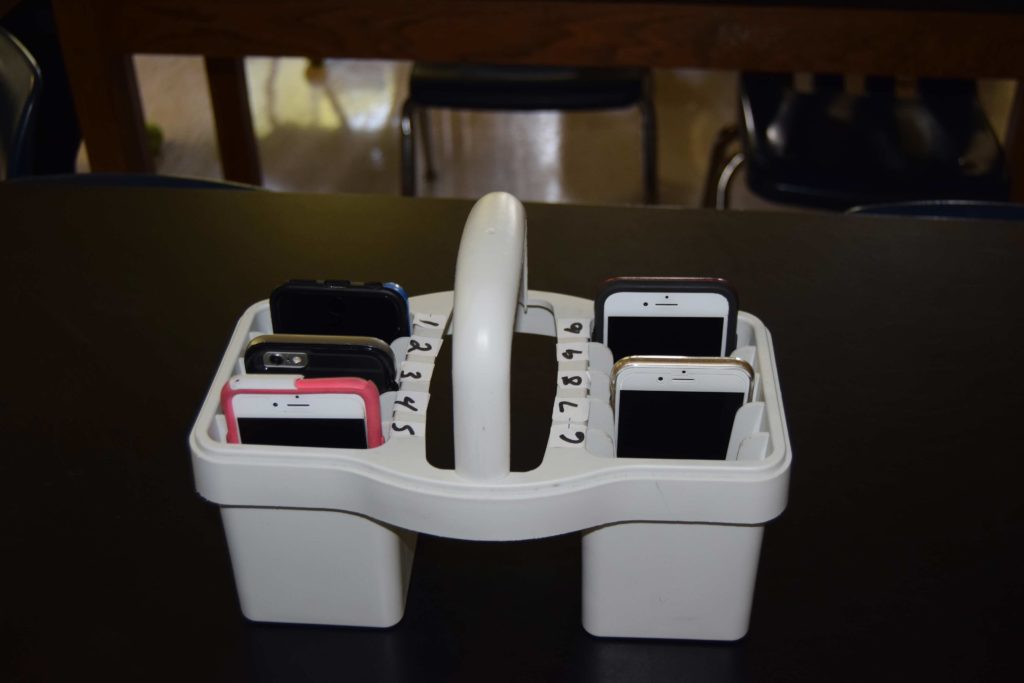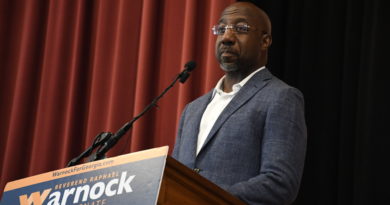
New cell phone policy impacts freshmen
Cell phones in the classroom create a number of distractions: social media, texting, cheating, taking pictures, live streaming, YouTube and Netflix, gaming, or even engaging in bullying and teenage drama.
To address this problem of phones creating unwanted distractions to learning, all Freshman Academy students at Cedar Shoals are now asked to hand in their phones to teachers at the beginning of every academic class period, starting at the beginning of the 2018-19 school year.
“I think that this policy is working because I think without the phones as a distraction, there is more learning, and less drama through social media,” said Mr. Matthew Baker, science department.
Since the phone policy does not explicitly require students to hand in their phones, not all students hand their phones in. This small loophole raises questions as to whether or not the new policy is effective.
“Not all of my students give me their phone. I give them the opportunity to hand it in, and after that the expectation is to not see them again. Some students just keep them put up all class, but other students do give them to me everyday,” said Baker.
“I think it helps kids from being off their phones. Even if they don’t give them up they will still keep them away so their teacher doesnt take it up for the rest of the day,” said Jose Tello, freshman.
Other students approach the situation differently, leaving devices at home or exhibiting more self control.
“I don’t give up my phone. I don’t even bring it to school because I never use it here,” said Anthony Guato, freshman.
“I never give up my phone because I don’t want it to get stolen or mixed up. I’m responsible enough to take care of my own things,” said Stephen Bowden, 9th grade.
“I don’t turn in my phone. I’m never on it anyways, and I always forget about it,” said Aveline Smith, freshman.
Teachers put students’ phones in their closets, in their own separate dividers so that phones don’t get stolen, lost, or misplaced.
Freshman Academy teachers estimate that around 30 percent of students give up their phones as opposed to 70 percent of those who keep their phones put away. Teachers believe that the students who keep their phones put away don’t have problems with them at all. Thus the policy sets a new expectation for phone usage.
“I turn in my phone to all of my teachers, especially Mr. Baker because he always takes them up and never forgets,” said Tello.
“It’s made a huge difference in how they are engaged in class. I’m not constantly having to tell students to get off of their phones and put them away,” said Mrs. Margaret Morgan, math department.
The new policy also allows teachers to stay on track while teaching. Teachers find themselves not having to repeat themselves after telling students to get off their phones.
“It allows freshmen to be more focused on work, it also keeps them from texting each other or using their phones during class”, said Alex Holland, freshman.
The new cell phone policy doesn’t guarantee that students will be off of their phones, but it helps to fix the problem of unwanted distractions in the classroom.
“We lost out on a lot of educational time last year due to a lot of cell phone related incidents, meaning Instagram, Snapchat, or any kind of posts or texts during school. That threw a lot of students and the academy off at times to where less time was academically focused,” said Mr. Henry Caudle, Associate Principal.
“I believe it is working. It reinforces what they did in 8th grade. They are more focused because the flow of instruction is better instead of having interruptions,” said Mrs. Cheryl Makemson, science department.
Some people may wonder why this policy only applies to freshman. After all, it isn’t just the freshman academy that has problems with phones, so why make the policy apply to freshman only?
“We’re just going to focus on the younger generation so that by the time they’re seniors, it’ll all be balanced out,” said Caudle.
Like any change to classroom routines, the new policy has its disadvantages and invites some criticism from students.
“It’s somewhat annoying because it takes time out of class, and if you get texted for an emergency from your parents you aren’t there to respond,” said Holland.
“It had a great response from parents and a great response from students at our open house. The only backlash I have received about the policy is from a select few students,” said Caudle.



